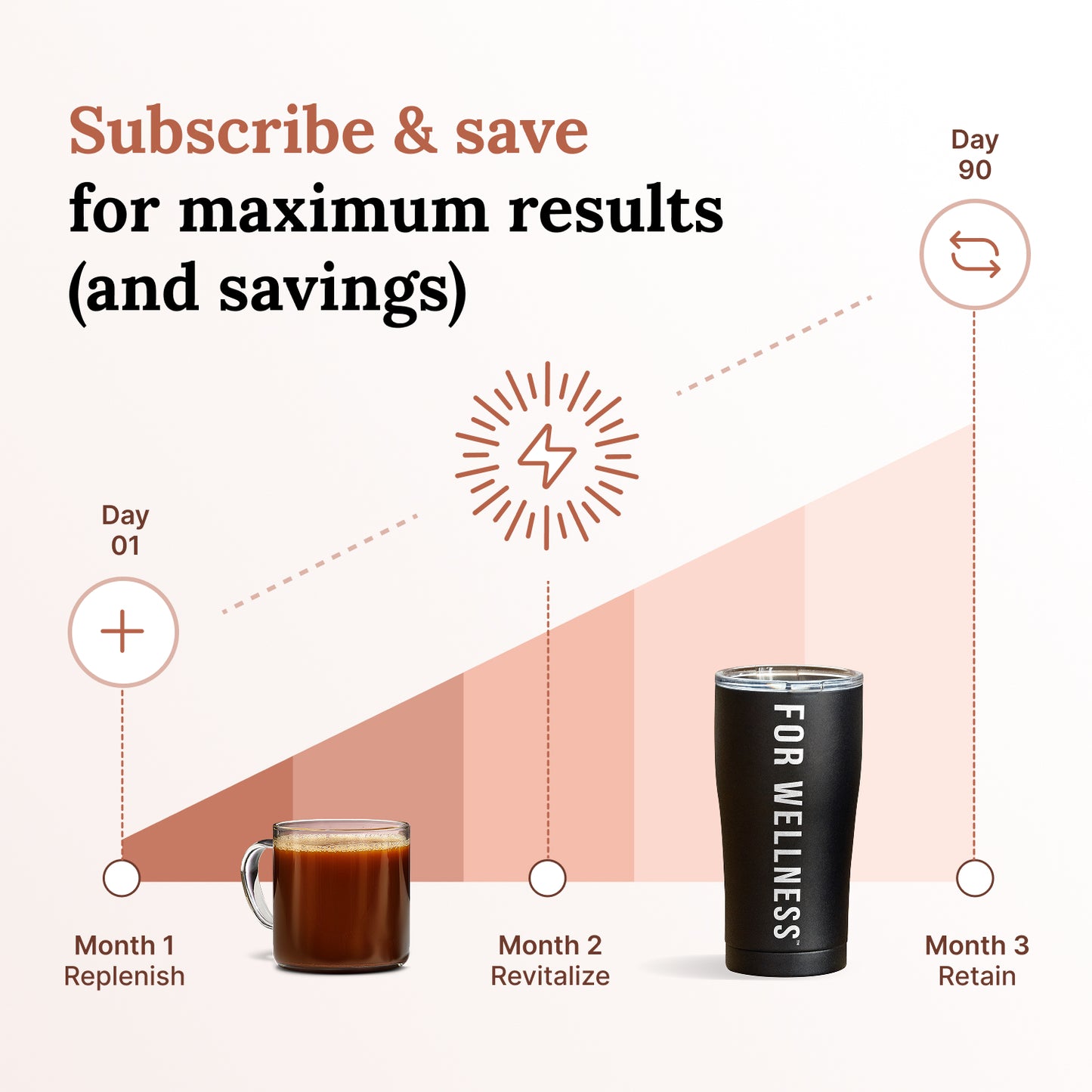The age-old adage insists that breakfast is the most important meal of the day. Yet, as life becomes increasingly hectic and trends like intermittent fasting gain popularity, more people are hitting the snooze button on breakfast. This is backed up by data suggesting that nearly one-quarter of Americans pass up morning omelets and cereal.
So, is it okay to skip breakfast? Could doing so actually have benefits, or is it detrimental to your health? The answer isn’t as cut-and-dried as you might think.
In this article, we explore the pros and cons of skipping breakfast, providing science-backed insights to help you make the best decision for your well-being.
Breakfast, What's In A Name?
Breakfast, quite literally, means “breaking the fast” that occurs overnight while you sleep. It’s the first meal you consume after a prolonged period of not eating, typically spanning from the previous night’s dinner until the morning.
The thing is, breakfast doesn’t necessarily have to occur during the conventional morning hours. So, if the first time you eat anything is at noon, then that becomes your breakfast. This flexibility challenges the notion that breakfast is strictly confined to the early hours of the day and opens up possibilities for when and what you choose to eat to break your overnight fast.


The Good Stuff - Performance
-
One scoop will infuse your coffee with healthy ingredients
-
Ditch the bad stuff like sugar, dairy, and artificial creamers
-
Fights inflammation and supports skin and joint health
-
Makes your coffee taste great
What Are The Benefits Of Skipping Breakfast?
If you decide to forgo breakfast in the morning, you’re practicing an eating approach called intermittent fasting. This means you eat all of your calories within a smaller window of time each day. The 16/8 approach, for example, involves eating all of your food in an eight-hour window and fasting for the other 16 hours of the day/night.
Here are some potential benefits of this approach:
May Help You Lose Or Maintain Weight
One of the main reasons people skip breakfast is to manage their weight. Unless you compensate by eating much more during your other meals, extending your overnight fasting period will reduce your overall calorie intake. This can lead to a calorie deficit and subsequent weight loss.
A 2020 systematic review concluded that intermittent fasting is a promising treatment for obesity. Out of 41 studies, 27 found weight loss of 0.8% to 13.0% of baseline weight with no serious adverse events. Most of the other studies found equal results when comparing intermittent fasting to calorie restriction.
May Improve Metabolic Health
Intermittent fasting has been associated with improvements in various markers of metabolic health, such as lower blood pressure, improved insulin sensitivity, and higher HDL (“good”) cholesterol levels. These improvements might be the result of weight loss achieved through intermittent fasting.
Additionally, skipping breakfast may improve your metabolic flexibility. This means your body is capable of easily switching from using glucose (sugar) as energy to using stored body fat and vice versa. In other words, your body can function well on whatever energy is available. A person who’s metabolically inflexible is more likely to experience things like unstable blood sugar levels, increased fatigue, and more irritability when food isn’t readily available.
May Support Ketosis
By prolonging the fasting period, your body has more time to deplete its glycogen stores and transition into ketosis, a metabolic state in which your body burns fat for fuel instead of carbohydrates. This can be particularly beneficial for those following a ketogenic diet, which aims to keep the body in ketosis to promote weight loss and other health benefits.
May Improve Your Morning Workouts
Do you like working out in the morning? If so, you’re probably aware that exercising on a full stomach isn’t always pleasant. By avoiding food intake before exercise, you can reduce the risk of experiencing nausea and reflux. What’s more, exercising in a fasted state may lead to increased fat burning, as your glycogen stores are low, prompting your body to rely more on stored fat for energy.
This isn’t the right move for everyone, though. Some people, especially those new to intermittent fasting, may experience low blood sugar when exercising on an empty stomach, resulting in symptoms like lightheadedness and dizziness.
Might Support Cellular Housecleaning
When you eat, your body has to spend a lot of time and energy processing the food. When you fast (i.e. don’t eat), your body can get to work on other bodily housekeeping chores. Referred to as autophagy, this involves cleaning out old built-up toxins and damaged cells and making necessary repairs. By not eating breakfast, you’re giving your body more time to tend to this upkeep, which can translate to improved health over time.
Can Simplify The Morning Rush
For many people, mornings are chaotic (no judgment!). Whether you’re trying to get your kids to school or get ready for work, skipping breakfast can free up time, making for smoother mornings.
What Are The Cons of Skipping Breakfast?
Here are some of the not-so-great consequences of skipping breakfast.
May Disrupt Circadian Rhythm
Your circadian rhythm serves as your internal clock, regulating essential processes such as sleep-wake cycles, hormone levels, and metabolism.
Some scientists think that eating breakfast helps keep your internal clock synchronized, which can improve sleep quality and reduce insomnia.
On the flip side, skipping breakfast may disrupt this delicate balance, resulting in sleep disturbances, daytime fatigue, and reduced cognitive function.
You May Miss Out On Key Nutrients
Eating a morning breakfast is an opportunity to consume essential nutrients. Skipping this meal may make meeting your daily nutrient requirements more challenging, increasing the risk of nutrient deficiencies over time.
May Reduce Energy Levels
Food is fuel, so skipping breakfast may result in decreased physical and mental stamina throughout the morning and beyond. This can manifest as lethargy, sluggishness, and difficulty concentrating, hindering your ability to perform daily tasks and engage fully in work or school activities. Additionally, low energy levels may impact your mood, making you irritable (aka hangry).
May Lead To Overeating Later In The Day
Skipping breakfast may lead to increased hunger and cravings later in the day. This can cause you to overeat during lunch and dinner, or snack excessively on high-calorie foods. If this happens, the extra calories consumed can lead to weight gain.
One study found that skipping breakfast three or more days a week increased the risk of weight gain by 11 percent. That’s not a huge amount, but it’s something to pay attention to if you choose the no-breakfast route.
The Verdict: Is it Okay To Skip Breakfast?
As you can see, both eating breakfast and skipping it offer distinct benefits. So, the decision about whether or not to eat breakfast should be based on your unique needs, goals, and lifestyle.
Certain groups of people may benefit from having breakfast, including competitive athletes and those who are pregnant, breastfeeding, trying to conceive, or taking blood glucose-lowering medications.
Others may benefit from skipping breakfast, especially those looking to lose weight or promote ketosis.
Morning Options: Breakfast vs. No Breakfast
So, what might morning look like for those who eat breakfast and those who don’t?
Breakfast Skippers
Those who skip breakfast often still enjoy a cup of coffee or tea in the morning. It can be an easy way to boost energy when you don't have an appetite. But, drinking caffeine on an empty stomach can result in increased jitters for some people.
Adding The Good Stuff™ or The Good Stuff™ Focus can be a great way to tame the jitters. These performance coffee supplements include premium, health-boosting ingredients, such as MCTs, L-theanine, and collagen. L-theanine, a naturally occurring amino acid found in tea, promotes relaxation and works to reduce caffeine-induced jitters.
Breakfast Eaters
For those who choose to eat in the morning, make sure to include protein-rich breakfast foods.
Eating protein in your morning meal has been shown to prevent overeating and unhealthy snacking later in the evening. This is because protein lowers levels of ghrelin (the “hunger hormone”).
Good protein sources for breakfast include eggs, Greek yogurt, chia seed pudding, and cottage cheese. You could even crumble a few Superfood Focus Bites in your chia pudding or yogurt for an added nutritional punch.
These Bites — which taste like a moist chocolate brownie, by the way — contain performance-packed ingredients like cacao, lion’s mane mushroom, and raw honey to fight inflammation, enhance focus, and boost gut health. If your breakfast includes carbohydrates, pass on sugary options like granola and Lucky Charms and opt for complex carbs like veggies, whole grains, nuts, and berries, instead.
🌱Psst!: Go green with The Everything Smoothie for breakfast!
The Bottom Line: The Choice Is Yours
Ultimately, the decision of whether to eat breakfast is up to you.
Whether you choose to enjoy a morning meal or just a morning cup of coffee with The Good Stuff™, planning your meals thoughtfully, paying attention to your body’s signals, and focusing on nutrient density is the winning recipe for improved well-being.
Written by Katie Koschalk, a health and wellness writer, certified holistic nutritionist, and certified personal trainer based in California.















